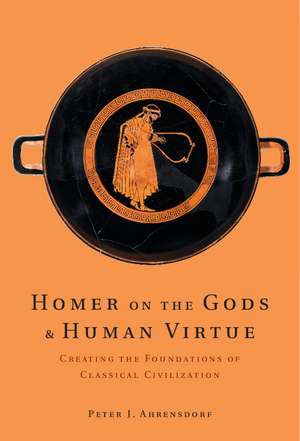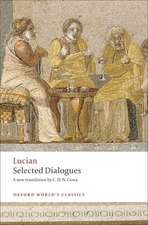Homer on the Gods and Human Virtue: Creating the Foundations of Classical Civilization
Autor Peter J. Ahrensdorfen Limba Engleză Hardback – 21 sep 2014
| Toate formatele și edițiile | Preț | Express |
|---|---|---|
| Paperback (1) | 280.58 lei 6-8 săpt. | |
| Cambridge University Press – 20 feb 2019 | 280.58 lei 6-8 săpt. | |
| Hardback (1) | 369.52 lei 6-8 săpt. | |
| Cambridge University Press – 21 sep 2014 | 369.52 lei 6-8 săpt. |
Preț: 369.52 lei
Nou
Puncte Express: 554
Preț estimativ în valută:
70.74€ • 73.53$ • 58.65£
70.74€ • 73.53$ • 58.65£
Carte tipărită la comandă
Livrare economică 05-19 februarie 25
Preluare comenzi: 021 569.72.76
Specificații
ISBN-13: 9780521193887
ISBN-10: 0521193885
Pagini: 278
Dimensiuni: 160 x 235 x 24 mm
Greutate: 0.64 kg
Ediția:New.
Editura: Cambridge University Press
Colecția Cambridge University Press
Locul publicării:New York, United States
ISBN-10: 0521193885
Pagini: 278
Dimensiuni: 160 x 235 x 24 mm
Greutate: 0.64 kg
Ediția:New.
Editura: Cambridge University Press
Colecția Cambridge University Press
Locul publicării:New York, United States
Cuprins
Introduction; 1. The theology of Homer; 2. Achilles and Hector; 3. Achilles and the limits of virtue; 4. Odysseus and Achilles.
Recenzii
'Turning to the epics of Homer as resources for reflection about the deepest sources of human virtue and happiness, Ahrensdorf's challenging and persuasive book, by inverting the familiar views of the central characters created by the poet, elucidates the relation between the singer of songs and the true meaning of excellence.' Arlene W. Saxonhouse, University of Michigan
'This provocative study will arouse controversy as it attempts to revive the ancient view of Homer as a teacher of virtue and to demonstrate that Achilles, rather than the apparently more lovable Hector or more rational Odysseus, really is the best of the Achaeans.' Jenny Strauss Clay, University of Virginia
'Peter J. Ahrensdorf's Homer on the Gods and Human Virtue is a profound and moving book. His argument will provoke healthy controversy. It will also demand respect for its meticulous attention to intellectual history and scholarly disputes, its fair-mindedness, and its gravitas. The book is gracefully written and intensely argued, exemplifying the courageous wisdom of the poet Homer and the warrior Achilles in reflecting on questions of justice, divine providence, human mortality and human happiness.' Susan Collins, University of Notre Dame, Indiana
'… [Ahrensdorf] gives us striking insights into the epics, and highlights Homer's humanity …' Susan Kristol, The Weekly Standard
'Ahrensdorf makes a strong - indeed, to my mind, irrefutable - argument that the apparently dutiful, home-loving Hector is in fact anything but that; in Ahrensdorf's treatment, Achilles rightly emerges as the more profoundly thoughtful and ultimately more compassionate man.' First Things
'Ahrensdorf shows the complexity and seriousness of Homer's moral universe. Especially strong is his examination of the virtue of Achilles' rage, the rage that begins the Iliad.' The Washington Free Beacon
'Under Ahrensdorf's hand, Achilles emerges as the only hero who truly rivals Homer himself in terms of the depth of his wisdom, and his liberation from convention inspires the later birth of philosophy in classical Greece.' Review of Politics
'Homer on the Gods and Human Virtue takes the poet seriously and, by doing so, illustrates the powerful voice that Homer and - more generally - literature can and should have within political philosophy. Unlike so many volumes, Ahrensdorf's new book on Homer successfully navigates between the twin dangers that haunt such endeavors: he neither cherry picks the story selectively to support his argument, nor does he lose sight of his thesis (and hence the philosophy) in the labyrinth of the poetry. As a result, this contribution successfully marries literature and philosophy. Ahrensdorf's introduction is a beautiful and succinct defense of the place of Homer in the study of politics, and the body of the book … explores the relationship between men and gods and the resulting implications for human virtue.' Michelle M. Kundmueller, Polis: The Journal for Ancient Greek Political Thought
'[Ahrensdorf]'s depiction of Homer as a philosophical poet of the first rank is compelling. This book is deserving of a close reading by scholars and students alike.' Robert J. Rabel, The Classical Review
'To call Peter J. Ahrensdorf's book on Homer 'thought-provoking' would be an understatement, as the length and substance of this review might convince you. It is a book to be read and reread, enjoyed and argued with, a book that will, with its swift pace and disarming forthrightness, whisk you through it in a few sittings.' Robert Goldberg, Interpretation: A Journal of Political Philosophy
'This provocative study will arouse controversy as it attempts to revive the ancient view of Homer as a teacher of virtue and to demonstrate that Achilles, rather than the apparently more lovable Hector or more rational Odysseus, really is the best of the Achaeans.' Jenny Strauss Clay, University of Virginia
'Peter J. Ahrensdorf's Homer on the Gods and Human Virtue is a profound and moving book. His argument will provoke healthy controversy. It will also demand respect for its meticulous attention to intellectual history and scholarly disputes, its fair-mindedness, and its gravitas. The book is gracefully written and intensely argued, exemplifying the courageous wisdom of the poet Homer and the warrior Achilles in reflecting on questions of justice, divine providence, human mortality and human happiness.' Susan Collins, University of Notre Dame, Indiana
'… [Ahrensdorf] gives us striking insights into the epics, and highlights Homer's humanity …' Susan Kristol, The Weekly Standard
'Ahrensdorf makes a strong - indeed, to my mind, irrefutable - argument that the apparently dutiful, home-loving Hector is in fact anything but that; in Ahrensdorf's treatment, Achilles rightly emerges as the more profoundly thoughtful and ultimately more compassionate man.' First Things
'Ahrensdorf shows the complexity and seriousness of Homer's moral universe. Especially strong is his examination of the virtue of Achilles' rage, the rage that begins the Iliad.' The Washington Free Beacon
'Under Ahrensdorf's hand, Achilles emerges as the only hero who truly rivals Homer himself in terms of the depth of his wisdom, and his liberation from convention inspires the later birth of philosophy in classical Greece.' Review of Politics
'Homer on the Gods and Human Virtue takes the poet seriously and, by doing so, illustrates the powerful voice that Homer and - more generally - literature can and should have within political philosophy. Unlike so many volumes, Ahrensdorf's new book on Homer successfully navigates between the twin dangers that haunt such endeavors: he neither cherry picks the story selectively to support his argument, nor does he lose sight of his thesis (and hence the philosophy) in the labyrinth of the poetry. As a result, this contribution successfully marries literature and philosophy. Ahrensdorf's introduction is a beautiful and succinct defense of the place of Homer in the study of politics, and the body of the book … explores the relationship between men and gods and the resulting implications for human virtue.' Michelle M. Kundmueller, Polis: The Journal for Ancient Greek Political Thought
'[Ahrensdorf]'s depiction of Homer as a philosophical poet of the first rank is compelling. This book is deserving of a close reading by scholars and students alike.' Robert J. Rabel, The Classical Review
'To call Peter J. Ahrensdorf's book on Homer 'thought-provoking' would be an understatement, as the length and substance of this review might convince you. It is a book to be read and reread, enjoyed and argued with, a book that will, with its swift pace and disarming forthrightness, whisk you through it in a few sittings.' Robert Goldberg, Interpretation: A Journal of Political Philosophy
Notă biografică
Descriere
This book seeks to restore Homer to his rightful place among the principal figures in political and moral philosophy.


![The [European] Other in Medieval Arabic Literature and Culture: Ninth-Twelfth Century AD](https://i0.books-express.ro/bt/9780230109407/the-european-other-in-medieval-arabic-literature-and-culture.jpg)








